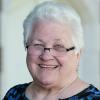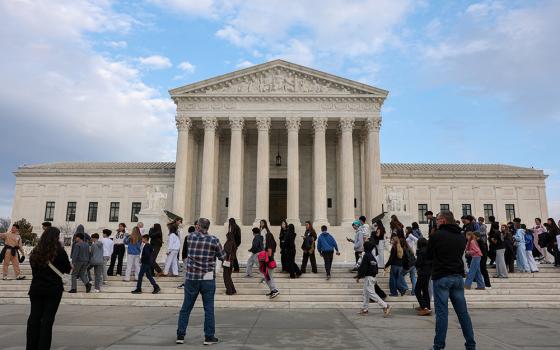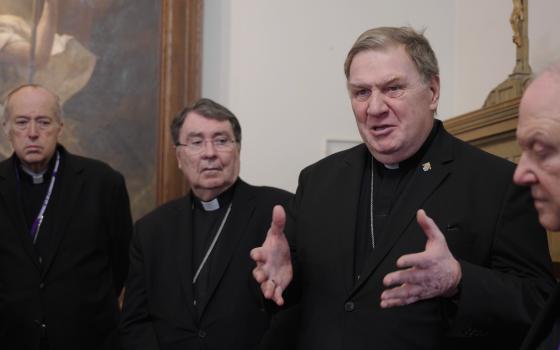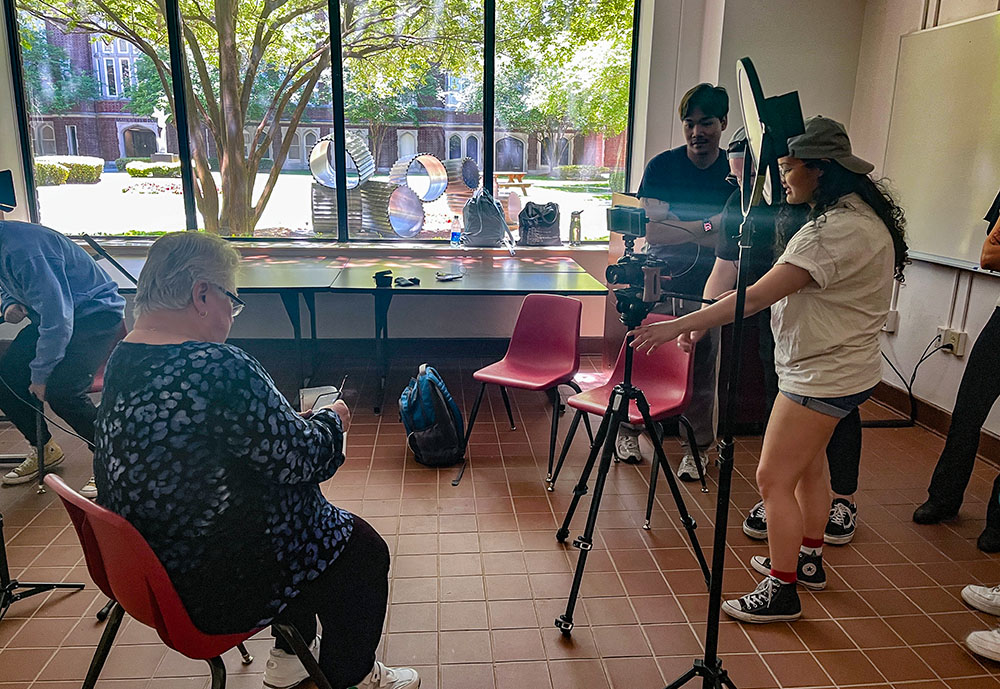
Students Duy Do, David Israel and Leila Jones set up for a podcast as Marianite of Holy Cross Sr. Judith Gomila waits to be interviewed at Loyola University New Orleans on July 23, 2024. (Claire Gallagher)
As a mission educator for the New Orleans Archdiocese for over a decade, I continually embraced the challenge of crossing borders — and inviting others to join me. Our goal for that role was to broaden the local church's understanding of what "catholic" (universal) means and to raise awareness of poverty and social exclusion at home and abroad.
To achieve this, our office frequently sponsored immersions for young adults, seminarians, medical personnel, families, catechists and youth ministers. Whether it was a border experience in Mexico, a catechetical vacation Bible school in Belize, or a medical mission outreach in Nicaragua, the dynamics of these immersions were remarkably similar.
Years later, a phone call from Claire Gallagher, project manager for the Flourishing Sisterhood project at Loyola University New Orleans, invited me to cross new borders — in age and technology. Claire asked me to consider being interviewed for a podcast. Before our pleasant conversation ended, inspired by the Holy Spirit, I gave Claire a wholehearted yes.
As a natural risk-taker, I was excited about this new adventure. A podcast was a different kind of border for this 84-year-old to cross. Loyola's campus was unfamiliar to me in recent years. A graduate of Our Lady of Holy Cross back in the day, I thrived picking up extra credits at the Loyola Institute for Ministry and in Xavier University's Black studies program well before the turn of the century.
Soon I was on Google, looking up the word "podcast." I knew about TED Talks and livestreaming events and had heard PBS advertising specific podcasts. "Get your fix of tech, true crime, pop culture or comedy with these audio adventures." But wait — there's more. In speaking about my communications ministry, I often quip that when at a computer, I know why they have dubbed that blinking thing the cursor. Think about it!
Advertisement
My audio adventure would be something new. Loyola students would ask questions and record my responses. All I needed to do to prepare was to reflect on my own vocation story and where God has taken me within my Holy Cross family and ministries.
I began serious prayer and reflection on my nearly 65 years as a Marianite of Holy Cross. I recalled what drew me to life as a woman religious. A graduate of Dance Masters, after high school I initially planned to open a mobile dancing school. Inspired by Lucille Ball's movie "The Long, Long Trailer," I imagined traveling to deprived areas to give free classes in tap, ballet and acrobatics to underprivileged youngsters. There could be so many benefits: motor skills, muscular strength, coordination, flexibility, self-esteem and good old-fashioned fun with peers.
My parents were hesitant but semi-supportive. When I consulted the Holy Spirit about my plan in 1958, I realized God had a more traditional but better plan for me.
Although I am a woman religious who sometimes struggles with being a religious woman, I have not looked back. Psalm 100's "Make a joyful noise to the Lord, all the earth! Serve the Lord with gladness! Come into his presence dancing and singing" are from my heart and on my lips. I am overwhelmed by God's extravagant love and grace.
Reflecting on the people and places I've experienced in my life and ministry, I am grateful for the spiritual mentors, peers and those I sought to serve who taught me so much.
My heart has been molded and shaped by other cultures. I take considerable pride in my learnings from the African American community, where I initially faced my personal biases and prejudices. In Native American communities of the Pacific Northwest (Alaska — God's frozen land!), I was ashamed to interface with the mistakes of early church missionaries and turned to St. Kateri Tekakwitha for solace and inspiration. In Central American countries, those we served had little in the way of material goods but lives of faith that were rich beyond measure.
These contemplative reflections were amazing, no-calorie nourishment for my soul in preparation for the podcast.
The day of the interview was truly exhilarating, and meeting the history class members who were setting up when I arrived was a joy. These Gen Z students, who grew up as digital natives, have seamlessly woven technology into their daily lives from an early age. The pre-interview conversation was a pleasure; they were professional, warm, and approachable. I had glimpses of their open-mindedness, idealism, good humor, and sense of equality.
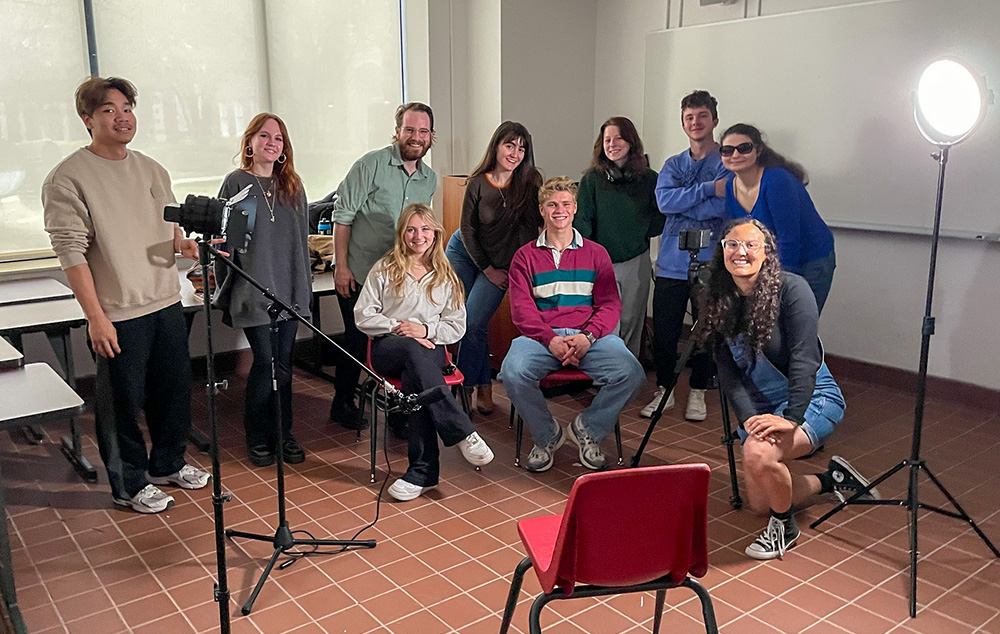
A group photo of the class: standing from left, Duy Do, Charlotte Berg, David Israel, Carmen Hershey, Mary Lynch, Oliver Ball, Alexis Gautreau; and sitting/kneeling from left, Ava Radosevich, Harvey Quiddington, Leila Jones (Justin Nystrom)
Despite being from different generations, we connected deeply, listening to and learning from one another with genuine empathy while the skilled technicians tinkered with equipment. I was at ease with this immersion. We were different generations lending a listening ear and heart to one another.
The young man and woman who led my interview had prepared probing questions that spanned my early life, the novitiate, ministry experiences and retirement age. Their questions were reflective of genuine inquisitiveness — community life, prayer, service and more.
I had no idea of their personal religious or spiritual beliefs, but their genuine interest impressed me. They were clearly committed to making these Flourishing Sisterhood podcasts transformational, not just for a grade on a transcript. I was so grateful for the chance to share my story and be listened to, especially by a younger generation.
Reflecting on this experience, I am genuinely grateful for the chance to share my journey and to learn from this Gen Z history class. This was a thoughtfully planned encounter, benefiting everyone involved.
Could similar interactions be organized between women religious or older persons in other Catholic institutions and young adults? Perhaps those who listen to a Flourishing Sisterhood podcast might deepen their awareness of God in their daily lives, consider a vocation within the church, or gain a greater appreciation for the diversity of the catholic sisterhood in the new millennium.
In the spirit of the Eucharist Congress, we embrace Jesus with renewed awareness of this sacrament of solidarity. Our brother Jesus challenges us to keep crossing borders of all sorts, to recognize and receive "the holy" in people and places from day to day. This is the call to be catholic — to be universally inclusive, to provide hospitality at the table of the Lord and the multiple tables of our lives, including those with microphones or a sound system. "Speak the truth in love" (Ephesians 4:15).
The Flourishing Sisterhood podcast episode can be found here: "A Rainy Day Holy Card: A Conversation with Sr. Judy Gomila, MSC."
